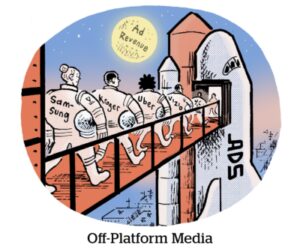TFW you wish you’d retained more from high school French class.
Because then you’d be able to read the French competition authority’s press releases in the original.
But although my French these days is très (très) mal, I can still recognize this phrase: “Il est reproché à Apple d’avoir abusé de sa position dominante.”
Translation: “Apple is accused of having abused its dominant position.”
France’s market competition regulator is now investigating whether Apple’s AppTrackingTransparency (ATT) framework represents an abuse of power.
‘Privacy Washing’
This is not the first time that L’Autorité de la Concurrence (ADLC) has poked around Apple’s privacy features.
Two years ago, the ADLC began a probe into ATT after receiving a joint complaint from ad industry organizations alleging that ATT advantages Apple and is unfair to third parties.
After conferring with the CNIL, France’s data protection authority, the ADLC ultimately decided not to force Apple to suspend the rollout of ATT – but it did so with seeming reluctance and said that it would continue to investigate the merits of the case.
The ADLC explicitly questioned the motives behind Apple’s move to release ATT, which Apple, of course, positioned as solely about consumer privacy protection.
At the time, Isabelle de Silva, the ADLC’s then-president, characterized the decision not to block ATT like so: “There may be privacy washing – we’re not naive … However, the GDPR is binding upon us.”
Entangled
The news that the ADLC is now moving forward with its ATT investigation is evidence that there are no clear-cut answers here.
The lines have blurred between data protection, privacy regulation and antitrust enforcement. It’s like a gordian knot.
For example, Apple exempts itself from ATT consent pop-ups for its own apps and services and implements less stringent rules to get consent for its own data collection and targeting.
Even if you’re not cynical about Apple’s aims and take its talking points about ATT at face value – that people should have a simple way to opt out of third-party ad tracking (emphasis on “third-party”) – the framework remains potentially problematic from an antitrust perspective, because it allows Apple to self-preference its own apps.
In other words, something ostensibly “good” (consumer privacy protection) could also be an antitrust violation. Weird world.
Which is why data protection authorities and their antitrust counterparts must collaborate and compare notes.
The conflicts between Google’s Privacy Sandbox proposals and regulator concerns about Chrome removing third-party cookies is another classic example of the interrelationship between privacy and antitrust.
Regardless of any purported consumer privacy benefits, the proposed changes to Chrome could incentivize advertisers to concentrate even more of their budgets with Google ad tech, at the expense of Google’s competitors.
In response to a complaint in 2020 that Google killing off third-party cookies would hurt online publishers and consumers, the Competition and Markets Authority (CMA), the UK’s antitrust regulator, conducted a joint investigation into the Privacy Sandbox together with the Information Commissioner’s Office (ICO), the country’s data protection regulator.
Eventually, Google made a series of commitments, including not to deprecate third-party cookies without the CMA’s approval. Google also agreed to ongoing CMA supervision over the development of APIs in the sandbox, and it files quarterly reports with the CMA – the most recent one was just published in late July – to keep the agency up to date on its progress.
And so the world turns.
Google’s stated purpose for the Privacy Sandbox – “creating a more private internet” – may sound simple on the surface. But all actions have consequences and ripple effects.
Because Google doesn’t exist in a vacuum. Google exists in an ecosystem over which it holds immense power and influence.
Andrea Coscelli, the CMA’s former chief executive, put it well back in 2021 in a statement responding to Google’s revised Privacy Sandbox commitments: “We have always been clear that Google’s efforts to protect users’ privacy cannot come at the cost of reduced competition.”
Thanks for reading! But I know why you’re really here. Please enjoy the best cat video I’ve seen in weeks. And also please let me know what you think of this newsletter. Drop me a line at [email protected].





















